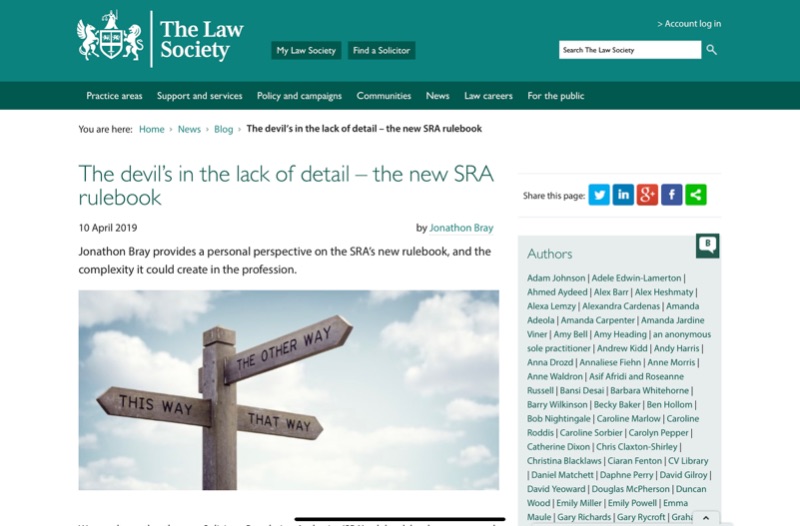SRA forced to rethink freelance solicitor changes?
The ongoing saga over the implementation of the SRA’s new rulebook took another twist this week.
The regulator has faced heavy criticism from both the Law Society and the Legal Services Consumer Panel (LSCP) for an ‘about turn’ on PII requirements of ‘freelance’ solicitors.
In the draft rules approved by the LSB, all freelance solicitors would have to carry ‘appropriate’ professional indemnity insurance. This was removed in the latest draft sent to the LSB, with PII requirement only retained for freelance solicitors providing reserved activities.
The LSCP is reported to have written to the LSB raising concerns about consumer protection and the scope for further confusion. She is quoted as saying that it is “unrealistic” to expect consumers to understand the different categories of solicitor let alone the different level of protection that different solicitors afford the individual depending upon their status.
Why it matters
The SRA is a public interest regulator, and so it seems odd – to put it mildly – that they would think it appropriate to reduce fundamental protections in this way.
The theory behind the changes of course are well-rehearsed – we are told that the public cannot access legal services and that in order to increase competition the profession must be freed up to be more competitive.
However, there is often a strong feeling that over the past decade or so, this obsession with competition is prioritised over the other regulatory objectives in the Legal Services Act.
I put this point to LSB Chair, Neil Buckley, at a recent Cardiff and District Law Society event. Mr Buckley assured the audience that this was not the case – that the LSB does not pursue ‘competition at any cost’.
We will see. There are certainly noises now being made that the new rule book, already put back to November, may face a further implementation delay. At least is part.

Read our latest blog published by The Law Society on why the new Codes of Conduct will present solicitors with new compliance challenges – the devil’s in the lack of detail.
CLC to streamline management of client account
- Making all managers responsible for the practice’s compliance with the Accounts Code
- Removing overly prescriptive requirements on the frequency for updating Accounting Records
- Requiring all Accounting Records to be kept for a minimum of 6 years; currently some records need be kept only for 2 years
- Removing detailed provisions in the Accounts Code that dictate the form an Accountant’s Report should take
Why it matters
It would seem that the CLC are attempting to follow in the footsteps of the SRA’s proposed changes to the Accounts Rules in that the focus is very much on the real risks to client money.
The streamlining is said to aimed at making the practitioner’s lives easier, ergo the regulator (if one were cynical). As with the SRA amendments, the ‘simplification’ of the rules may bring with it increased guidance and CLC practitioners should therefore be wary of whether such guidance will become de facto rules.

SDT standard of proof to be relaxed
The Solicitor’s Disciplinary Tribunal (SDT) has announced that it will be adopting the civil standard of proof. If the proposed change is accepted by the LSB then this will take effect from 25th November 2019 in line with the implementation of the new Handbook.
The Law Society has condemned the proposal and has written to the LSB expressing its concern. It is of the view that moving away from the criminal (“beyond reasonable doubt”) to the civil (“on the balance of probabilities”) standard of proof may lead to more miscarriages of justice within the profession.
Why it matters
It would seem that the Law Society’s concerns are justified, as the High Court has recently criticised the SDT’s handling of cases and it’s “lack of clarity” in Lorrell v Solicitors Regulatory Authority.
The case concerned Mark Lorrell who was struck off for misconduct after having acted for a litigation client and their litigation funder, leading to a potential conflict of interest. Mr Justice Martin Spencer concurred with the SDT’s decision with regards to Mr Lorrell being found guilty of misconduct but disagreed that this should have led to a strike-off. He ruled that: ‘There are aspects to the decision of the SDT on sanction which indicate a lack of clarity of thought on their part.’
The profession will undoubtedly have concerns about a lower standard of proof being used by a tribunal to decide cases.
What will be the impact on the day-to-day regulation of solicitors? One could see how an emboldened SRA, confident that it is able to secure easier prosecutions in the SDT, may well alter its style of enforcement accordingly.
This is particularly worrying in a world of principles-based regulation, where the misconduct ‘line’ comes down to a matter of interpretation.

Practice notes and guidance
- Updated Article 50 extension guidance – issued by the Law Society in light of the delayed UK departure from the EU.
- International data transfers – very useful guidance from the ICO

Disciplinary decisions
- Michelle Laura Davies has been suspended following her conviction for permitting the production or attempted production of cannabis in her home. The SDT found that she had shown “ongoing acquiescence” in relation to the activities of her husband but were satisfied that suspension was the correct punishment rather than strike-off due her display of insight and genuine remorse. She was ordered to pay £2,800 in costs.
- Mark WIlson, a non-solicitor formerly employed as office supervisor with Blake Morgan has received a section 43 order which prevents him from working in an SRA authorised entity. He was sacked for misconduct by the firm for having falsified three overtime claim forms, one for himself and two for colleagues.
- Jill Elizabeth Benbow has been fined for £8,000 and ordered to pay £1,632 in costs following her second conviction for drink driving. The SRA had originally reached an agreed outcome of a £4,000 fine, however the SDT considered this to be too lenient.








